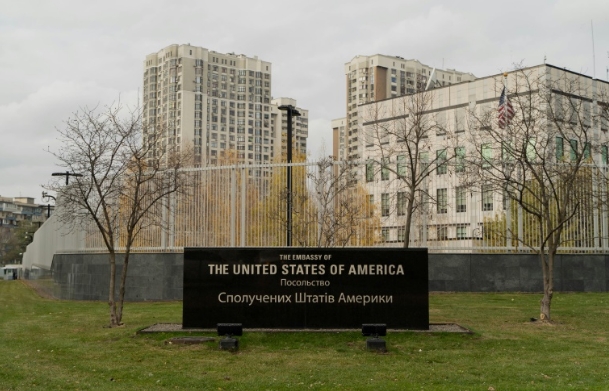
Tanya DZAFAROWA/AFP
Ukraine on Wednesday called on its Western allies not to fuel tension inside the country, after a string of embassies in Kyiv announced they would close, citing the threat of a “massive air attack” on the capital.
The warnings of fresh strikes come as Moscow looks to retaliate against Ukraine for firing US-supplied long-range missiles on Russian territory for the first time and with the Kremlin accusing outgoing US President Joe Biden of dragging out the war.
Russia has already ramped up a wave of deadly missile strikes in recent days, targeting residential areas and Ukraine’s energy grid. Air alerts blare out across the country daily.
The United States led the wave of closures, saying it was shutting its Kyiv office to the public after having received “specific information of a potential significant air attack” on Wednesday.
It did not provide further details.
Greece, Hungary, Italy and Spain — all NATO members — followed suit, announcing the closures of their diplomatic premises in the capital.
Ukrainian officials criticised the rare move and called on its allies not to spread yet more fear among Ukrainian society.
Kyiv said the “information” the US was referring to looked to be a “psychological operation” launched by Moscow in a bid to destabilise the country.
“We remind you that the threat of strikes by the aggressor state has unfortunately been a daily reality for Ukrainians for over 1,000 days,” Ukraine’s foreign ministry said in a statement on social media.
The GUR military intelligence directorate said a “fake” message was being spread on social media, purporting to be a warning from them over a massive bomb attack on Kyiv.
“A terrorist country is conducting a massive information and psychological attack against Ukraine,” it said in a statement.
Nerves are already frayed in Kyiv after almost three years of war, and Trump’s victory in the US presidential election has injected fresh uncertainty.
The Republican has repeatedly criticised US support for Ukraine and claimed he could broker a ceasefire within hours — comments that have triggered fears in Kyiv and Europe about Ukraine’s ability to withstand the Russian attacks without American support.
Both Ukraine and Russia are jockeying for upper hand on the battlefield before he re-enters the White House in January.
Russia on Wednesday accused Biden of prolonging the war by stepping up weapons deliveries to Kyiv in his final weeks in office.
“If you look at the trends of the outgoing US administration, they are fully committed to continuing the war in Ukraine and are doing everything they can to do so,” Kremlin spokesman Dmitry Peskov told reporters.
Peskov was responding to the US saying it would soon provide Ukraine with antipersonnel land mines.
World leaders have taken note of the step-up in American support for Kyiv.
Turkey’s President Recep Tayyip Erdogan, a NATO ally of the US, said Wednesday the decision to allow Kyiv to use the powerful long-range missiles was a “big mistake.”
“This step by Biden will not only escalate the conflict, but will lead to a greater reaction from Russia,” Ergodan, who sees himself as a possible mediator, told journalists.
Moscow has struck a defiant tone, pledging retribution and continuing its advance on the front lines.
Its forces claimed Wednesday to have captured the town of Illinka, close to the strategic hub of Kurakhove in the eastern Donetsk region.
The Kremlin also rejected as “absurd” and “laughable” suggestions it was involved in the cutting of two telecommunications cables running under the Baltic Sea.
European officials have said they suspect “sabotage” and “hybrid warfare” linked to Russia’s invasion of Ukraine.
Despite increased rumblings of possible talks to end the conflict, there is no sign of Putin and Ukrainian President Volodymyr Zelensky being anywhere close to converging on a possible deal.
Zelensky, who warned Tuesday Ukraine would lose the war if Washington pulled funding, has ruled out ceding territory in exchange for peace.
Putin has demanded Ukraine’s troops abandon four regions in its south and east as a precondition to ceasefire talks.
Both have rejected a temporary pause in combat or freezing of the conflict along the current front lines.
(AFP)
